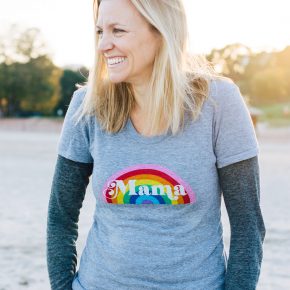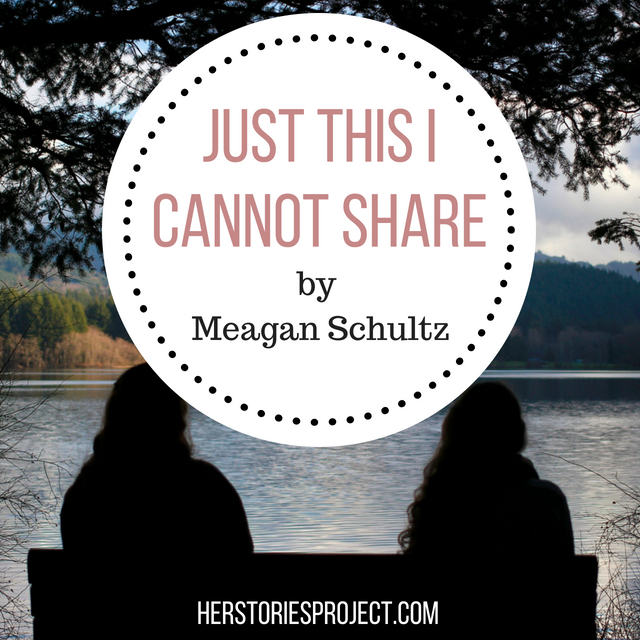Today’s guest post is from Meagan Schultz, who writes about the times when pain cannot be shared, even during the closest friendship.
By Meagan Schultz
I never would have thought there were things I would not share with my best friend. I would have called bullshit if you’d tried to tell me that in my twenties. We were BFFs before BFFs were a thing. If we’d believed in the sisterhood of blood, we would have poked our fingers a thousand times over for each other. Ours was a fierce love.
It was like new romance when we met. I was twenty-four, she was twenty-three. I was the American in London, trying on adulthood like an oversized sweater with sleeves that hung to my knees. She studied English Literature at Cambridge, read voraciously, and worked in politics. I had a liberal arts degree that left me with keen observational skills and a gift for description, but little else. Working as a travel agent, I helped young affluent American students circle European capital cities again and again. It wasn’t a dream job, but I was living in London with a house full of Brits, one of whom was my boyfriend, and a sink full of dirty dishes. I was happy.
She and I giggled like children and devoured each other’s stories over hummus and white wine at a Turkish restaurant in Soho on our first “date.” It was an unusually warm spring night and we sat outside on the corner, oblivious to the throngs of passersby on their way home from work, or to the theaters, or on their own first dates. We stayed as late as we could and hugged tightly when we parted ways at the bottom of Brixton Hill, both recognizing the intensity of the friendship we had just birthed together over grape leaves and pinot grigio.
The next decade would see us growing into ourselves and each other like winding wisteria, inextricably bound by the vines of shared experience and reckless love.
There was no secret safe between us. The boyfriend who brought me to the UK would later become the husband, but when he left me, it would be she who would pick up the pieces. She would knock on my door, soak up my tears and then take me out, knowing I did not want to go, but also knowing I did not know where else to be. She knew me better than I knew myself. And I loved her for that.
So when she said to me, “I’m sorry, but you just cannot understand what I’m going through right now,” after the deaths of her twin boys, minutes outside of utero at twenty-six weeks, I nodded, but was quite certain she was wrong.
I wanted so much to understand her. She had been my best friend for eight years. I wanted to carry her through this grief the way she’d carried me through mine. I tried with all my heart to understand, to feel her pain, as if she were my own twin. I read books, scoured the internet for hours reading stories of other mothers who had lost the children growing inside them, and tried to imagine what it must’ve felt like to wake with an empty womb once stretched for two.
“It’s unbelievable how physical it is, the sense of loss,” she would tell me. “I can’t get used to the fact that this huge bump has gone but there is nothing, and I keep having this overwhelming physical urge to hold something against my chest.”
I listened; I heard what she was saying, though I had nothing to compare it to then. I had no children of my own and could not yet comprehend the ache of a full breast and a broken heart. I had only lost a great-grandmother to old age, a natural death. I wanted with all of my being to slip into her shoes, to take some of the pain.
At first I blamed her. It was her fault, I thought, that I could not understand. If she would only let me in, share her pain, unleash her sorrow, I could lift her up and out of the fog that was suffocating her, like I always had. If she would only let me try to make her smile, I could help dissipate the anger she clung to so desperately in order to make sense of her new childless existence. But I could not make her share and our friendship wordlessly shifted shape.
It would scare me when she would not smile. I wondered if my old friend would return and whether we would ever share secrets late at night, lying in her bed, losing ourselves in fits of giggles under the duvet. If the sleeves of adulthood that once hung down my sides were inching their way up my arm as I grew into them, hers had been thrust into a hot water cycle and now threatened to choke her. She understood adulthood all too well, strangled by the impermanence of life, crushed under the weight of misfortune.
Eventually life brought me back to the United States, and a new love kept me there. Three years later, when I suffered my first miscarriage, I would begin to understand why it was impossible for her to share. Though I couldn’t articulate it then, I understood that death is the great divider, keeping us apart and alone, even if we are still very much together.
She understood well before I did, that some things cannot be shared.
I wish I had learned that lesson when she tried to teach me. Instead, I learned it when I had become the teacher, after my own losses. I could tell friends about my grief, as she had tried to tell me, but it was mine alone to hold. I see that now. Perhaps this is the one lesson in life we must learn by ourselves; the experience that we share only because we cannot share, until eventually, we can. But even then, the grief is our own, each of us coping differently, needing our own personal recovery plan, on the path towards a new normal.
Though we are miles apart these days, my friend and I still share what we can. We’ve both found our new normal in our respective cities, with our own families, sending birthday cards when we remember and stealing late night glimpses of each other mothering on Instagram. Life continues to move forward as we knew it would. Where we once wished it would hurry along to move us away from the pain, we now hope it will slow down. Winter has come and gone, and we have finally grown comfortable in the bulky sweaters that once hung to our knees.
 Meagan Schultz is a mother and writer living in Milwaukee with her husband and three young children. She’s been a contributing writer for MKE Moms Blog and WUWM’s Lake Effect Program. Her work has been published on Brain, Child, Literary Mama, Mamalode, and in several anthologies. She is also the creator of the 21-day E-Course “An Invitation to Grieve” for women who’ve experienced miscarriage(s). Between naps with reheated coffee, she occasionally blogs at http://www.meaganschultz.com.
Meagan Schultz is a mother and writer living in Milwaukee with her husband and three young children. She’s been a contributing writer for MKE Moms Blog and WUWM’s Lake Effect Program. Her work has been published on Brain, Child, Literary Mama, Mamalode, and in several anthologies. She is also the creator of the 21-day E-Course “An Invitation to Grieve” for women who’ve experienced miscarriage(s). Between naps with reheated coffee, she occasionally blogs at http://www.meaganschultz.com.

 Follow
Follow
